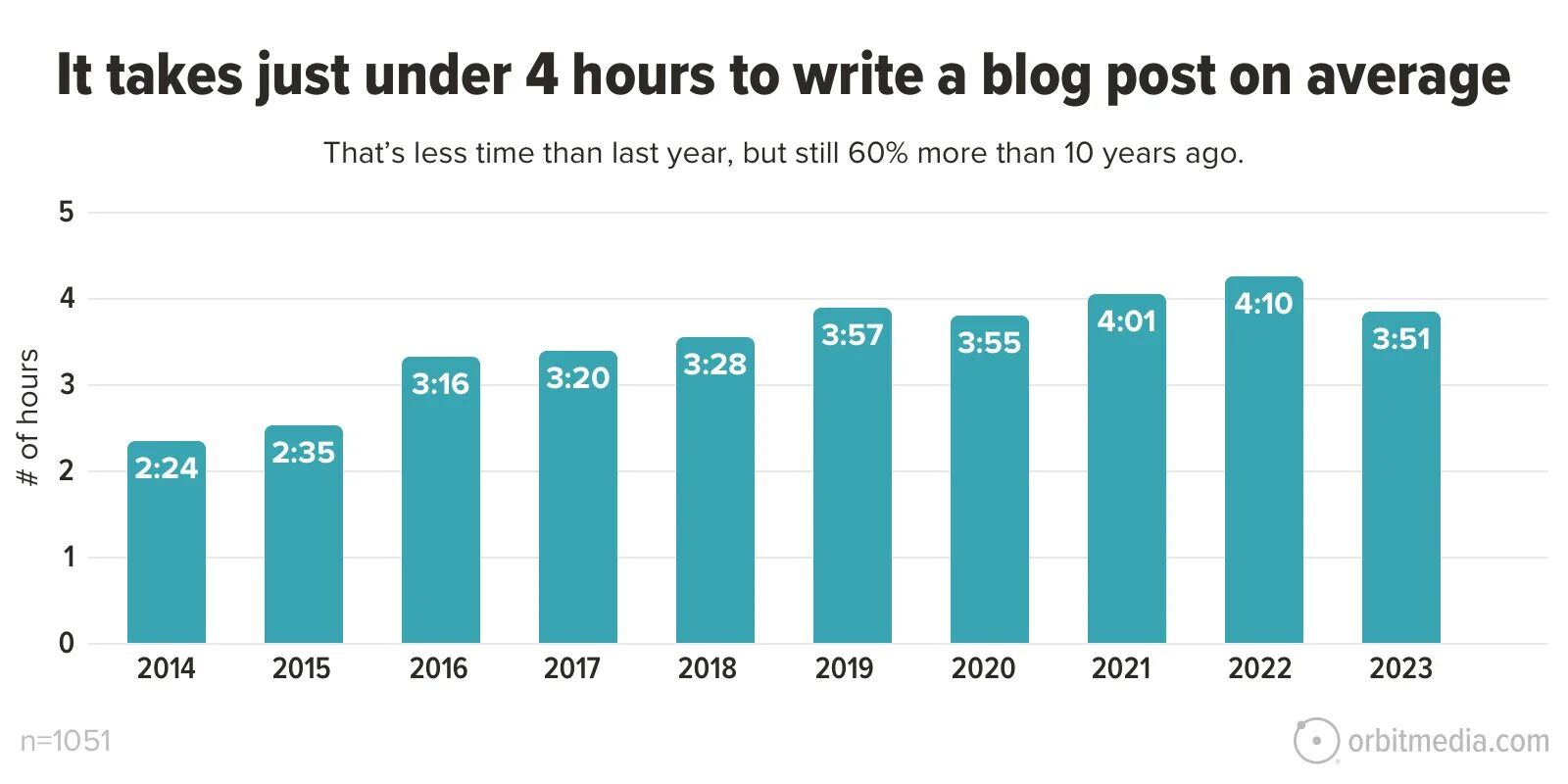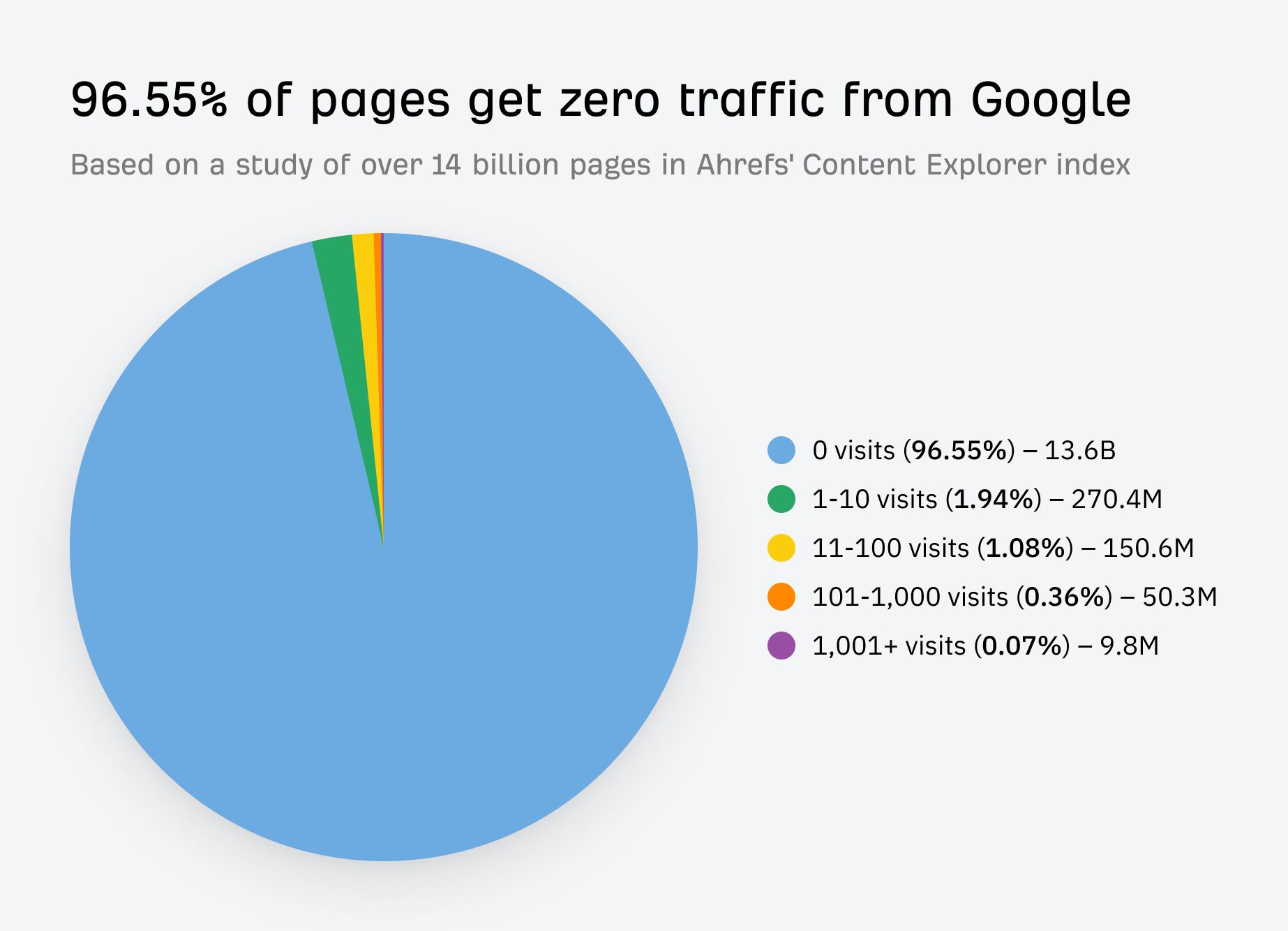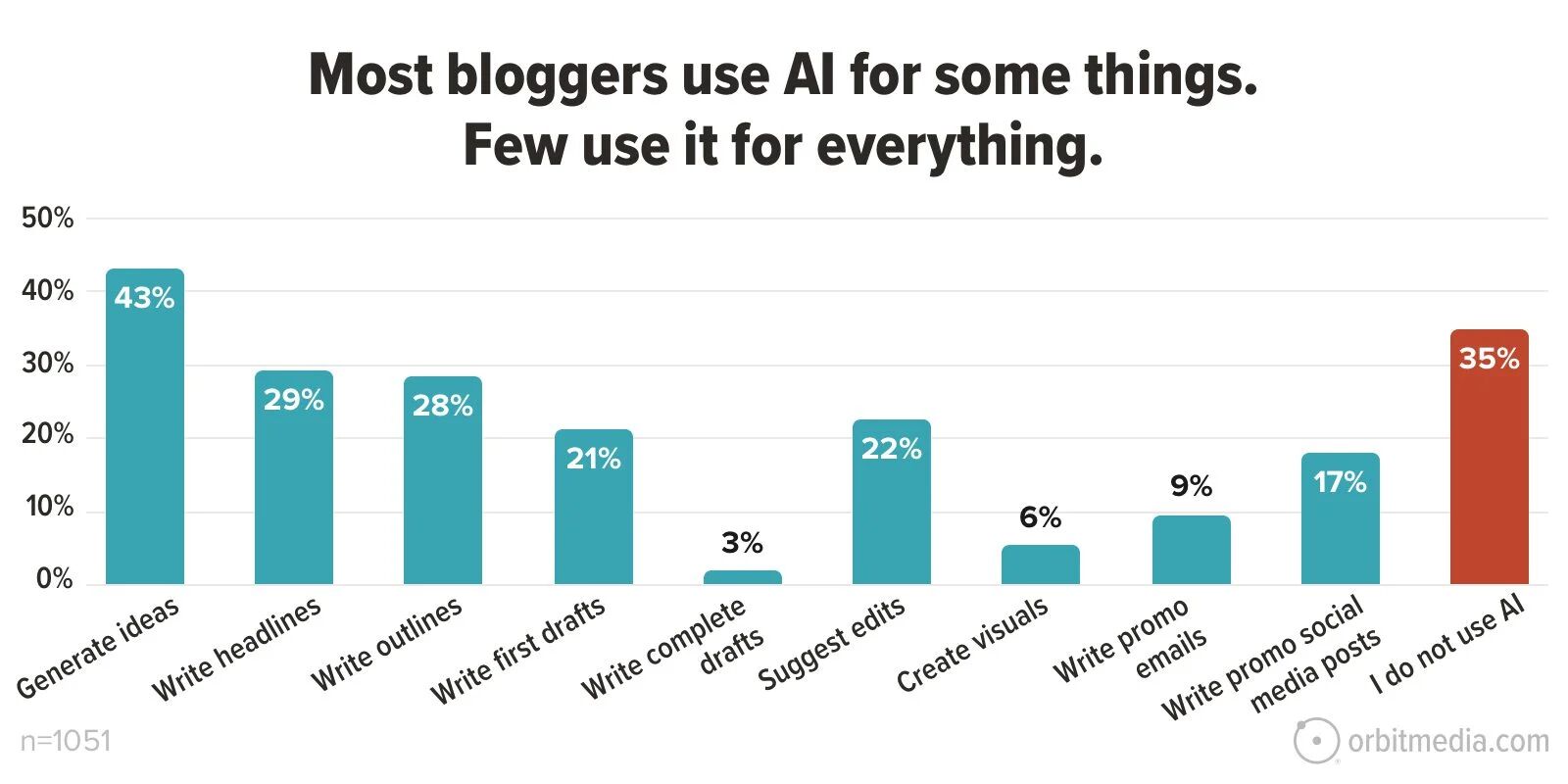We’ve curated, vetted, and categorized a list of up-to-date statistics below.
These are the most interesting blogging statistics you should know.
- 71% of marketers report that content marketing has become more important to their organization in the last year. (Content Marketing Institute)
- There are more than 600 million blogs out of 1.9 billion websites worldwide. (Web Tribunal)
- 77% of internet users still read blogs. (Social Media Today)
- Nearly 26% of people in the U.K. aged 5–18 are reading blogs (Statista)
- There is a strong positive correlation between word count and backlinks, but only up to 1,000 words. For posts longer than 1,000 words, there is a strong negative correlation between word count and backlinks. (Ahrefs)
- There is a moderate correlation between content length and organic traffic, but only up to 2,000 words. For posts longer than 2,000 words, there is a moderate negative correlation between word count and organic traffic. (Ahrefs)
- 80% of bloggers are driving strong marketing results. (Orbit Media)
- 50% of bloggers publish weekly or several times per month. (Orbit Media)
- Bloggers who publish the most are most likely to report “strong results”. (Orbit Media)
- 74% of bloggers use 1-3 images per post. 2% of bloggers add 10+ images to a typical blog post. (Orbit Media)
- 59% of links shared on social media are shared without ever being read. (Chicago Tribune)
What’s the state of blogging in 2024? Here are some statistics that may surprise you.
- WordPress powers over 43.2% of the internet. (W3Techs)
- ~70 million new posts are published on WordPress each month. (WordPress).
- 77 million new comments are added to WordPress posts per month. (WordPress).
- Tumblr hosts over 518 million blogs, while WordPress hosts over 60 million blogs. (Web Tribunal)
- 3 billion blog posts are published each year worldwide. (GrowthBadger)
- There are over 31 million active bloggers posting at least once per month in the United States. (Statista)
- More than half of consumers will stop what they are doing if they encounter issues when viewing content (Adobe)
- 44% of buyers say they typically consume three to five pieces of content before engaging with a vendor (Demand Gen Report)
- From 2023 to 2027, the global content marketing industry is expected to grow by $584.02 billion. (ReportLinker)
Do bloggers really earn money? Or is it just a pipe dream? Check out these statistics on blogging revenue.
- The most popular monetization method for bloggers is Google AdSense, followed by affiliate marketing. However, for high-income bloggers, AdSense ranks third; these bloggers are 2.5 times more likely to sell their own product or service than use AdSense. (GrowthBadger)
- Bloggers make most of their income from ads, affiliate products, sponsored product reviews, selling their own products, and online courses. (RankIQ)
- 45% of bloggers who earn over $50,000 per year sell their own product or service, while only 8% of lower-income bloggers do that. (GrowthBadger)
- 72% of bloggers making $2,000+/month use either Mediavine or Adthrive as their ad management company. (RankIQ)
- The most profitable niche is the food blog niche. Food bloggers have the highest median monthly income ($9,169) as compared to bloggers from all major niches. (RankIQ)
- The niches that have the highest percentage of blogs with over 50,000 monthly sessions are food (42.8%), lifestyle (13.3%), and travel (10%). (RankIQ)
How difficult is blogging? What challenges are bloggers going through? Here are some stats.
- Engagement drops for posts with a reading time longer than seven minutes. (Medium)
- The biggest challenges for content marketers is generating leads and measuring ROI. (Siege Media)
- 50% of bloggers struggle to find time and to attract visitors. (Orbit Media)
- 73% of people admit to skimming blog posts, while 27% consume posts thoroughly. (HubSpot)
- 75% of the public prefers reading articles under 1,000 words. (Contently)
With so much competition, plus AI, bloggers need to create higher-quality content. Check out these statistics on content and quality.

- The average blog post takes 3 hours and 51 minutes to write. (Orbit Media)
- 35% of bloggers who spend 6+ hours on a typical article report “strong results.” (Orbit Media)
- The average blog post length is 1427 words long. (Orbit Media)
- Only 3% of bloggers regularly publish 2,000+ word article. Most bloggers publish articles in the 500-1500 word range. (Orbit Media)
- The longer the typical blog post, the more likely the blogger is to report “strong results.” (Orbit Media)
- 76% of bloggers publish educational content. (Orbit Media)
- 25% of bloggers use video. (Orbit Media)
- 47% of bloggers are conducting original research. (Orbit Media)
- Nearly 3x more bloggers work with an editor now than in 2014. (Orbit Media)
- A business that spends more than $4,000 or more per post is about 2.6 times as likely to report its strategy as “very successful” than a business that spends $0-$500. (Siege Media)
- 62.3% of content marketers are creating interactive content as part of their content marketing strategy. (Siege Media)
To get consistent traffic to your blog, you first need to get your article indexed and ranking in the search engines.

- 68% of online experiences begin with a search engine. (BrightEdge)
- 96.55% of pages get no organic search traffic from Google. (Ahrefs)
- Only 1.94% of all pages get between one and ten monthly search visits from Google. (Ahrefs)
- The top-ranking page gets the most search traffic only 49% of the time. (Ahrefs)
- There’s a positive correlation between the number of websites linking to a page and its search traffic. (Ahrefs)
- There’s a positive correlation between the number of websites linking to a page and its ranking position. (Ahrefs)
- Only 5.7% of pages will rank in the top 10 search results within a year of publication. (Ahrefs)
- The average top-ranking page also ranks in the top 10 search results for nearly 1,000 other relevant keywords. (Ahrefs)
- There’s no correlation between Flesch Reading Ease scores and ranking positions. (Ahrefs)
- 68% of SEOs use content as a way to build links. (Aira)
- 74% of bloggers are updating old content. (Orbit Media)
- Bloggers who pay more attention to keywords more often, are more likely to report success. (Orbit Media)
- 66% of bloggers are driving traffic to their content via SEO. (Orbit Media)
Your blog can’t go viral overnight. You need to promote it. One way is via social media. Check out these stats.
- 92% of bloggers are driving traffic to their content via social media. (Orbit Media)
- Short-form video is the #1 content marketing format, with 31% of content marketers saying it offers them the highest ROI. (HubSpot)
With ChatGPT on the scene, most bloggers are turning to AI. How much are they relying on AI? Look at these stats.

- 43% of bloggers use AI to generate ideas. (Orbit Media)
- 29% of bloggers use AI to write headlines. (Orbit Media)
- 28% of bloggers use AI to write outlines. (Orbit Media)
- 21% of bloggers use AI to write first drafts. (Orbit Media)
- 3% of bloggers use AI to write complete drafts. (Orbit Media)
- 22% of bloggers use AI to suggest edits. (Orbit Media)
- 6% of bloggers use AI to create visuals. (Orbit Media)
- 9% of bloggers use AI to write promotional emails. (Orbit Media)
- 17% of bloggers use AI to write promotional social posts. (Orbit Media)
- Bloggers who use AI are not more successful than other bloggers. (Orbit Media)
- 57.2% of content marketers have considered replacing their internal or external resources with AI. (Superpath)
Guest blogging is alive and well, and it’s still a great way to acquire links and be exposed to a large audience.
- 64.9% of link builders use guest blogging as their link building strategy. (Authority Hacker)
- The average cost of publishing a paid guest post is $77.80. (Ahrefs)
- 50% of bloggers perform outreach for guest posts to 10 or fewer contacts a month, while 7% of them pitch to 100 or more blogs per month. (Referral Rock)
- 60% of bloggers write one to five guest posts per month. (Referral Rock)
- 87% of bloggers come up with guest post ideas themselves, but only 52% of them do the actual writing. (Referral Rock)
Final thoughts
Want to learn more about blogging and content marketing? Get started with these guides:


